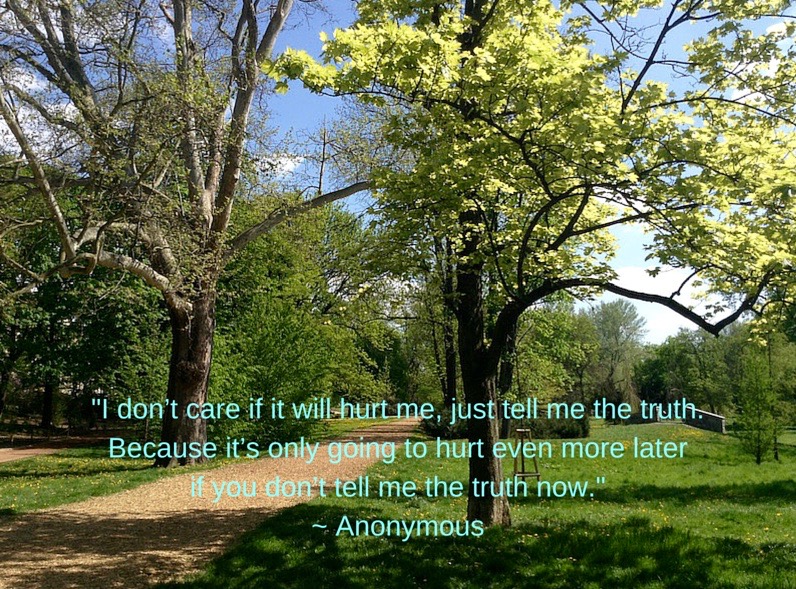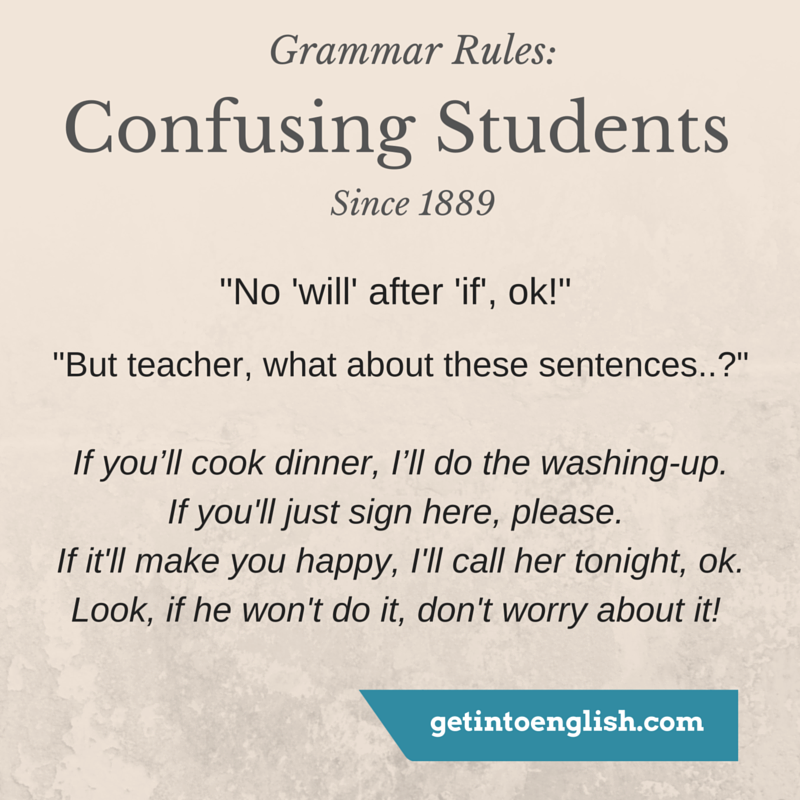You’ve probably read in some English coursebooks that the words if and will can’t be used together in a sentence. However, as you’ll see today, that’s not true!
First up, what the coursebooks mean is that if and will can’t be used together in some specific situations. For example, when you’re forming a regular conditional sentence, perhaps to talk about something that the speaker sees as a real possibility, the two words appear in two separate parts of the sentence:
- If I don’t get the promotion, I’ll look for another job.
- I’ll look for another job if I don’t get the promotion.
I’ll look for another job if I won’t get the promotion.
Another example:
- If I don’t see her at the party, I’ll give her a call.
The first part of this sentence is the condition that we are talking about, whereas the second part of the sentence refers to the result or outcome that we think will happen.
[Please note that today we’re concentrating on if and will, but just in case you’re wondering, you can also use other modal verbs such as might, should, and so on. For example:
If I don’t see her at the party, I might/should/can give her a call.
nb. I’ll write more on this very, very soon!]
You’ll see below that will can indeed be used after if, but it might take some time for you to feel comfortable with this. Please read the following and feel free to ask any questions in the comments section.
When ‘If’ Is Friends With ‘Will’
Here are some examples of when if and will in fact do work together as friends:
1. “I don’t know if it will happen.”
This example is not a conditional sentence.
It’s a bit like saying: “I don’t know whether or not it will happen.” Therefore, you wouldn’t say:
It will happen if I don’t know.
In fact “It will happen if I don’t know” has a completely different meaning.

2. “If you’ll just take a seat, please. Mr Smith won’t be long.”
This is a good example of a polite way to make a request.
It’s similar to: “If you are willing to just take a seat..”
Other examples of ‘the polite if you will‘ include:
- “So if you’ll just sign here, that should be it.”
- “Great, if you’ll follow me, I’ll show you to your room.”
- “If you’ll excuse me for a minute, I’ll check on how Jill is going.”
- “Now, if you’ll recall, we arrived at about 10 o’clock in the morning.”
- “If you’ll look at my resumé, you’ll see I am more than qualified for the position.”
Connected to making a request, you can also use this phrase in an angry way or to show frustration or annoyance:
- “Oh man, if you’ll just shut up for a minute and I’ll tell you!”
You can see from my search on the corpus of Contemporary American English that if you will is often followed by these words:

3. Fixed Phrase – “If you will”
This phrase is not used in its contracted form (ie we don’t say if you’ll). It’s still in use although some believe it can be a bit pompous (= showing self-importance).
We use it in speech when we feel that our choice of words is not the best or it can be used to soften the point:
- “It’s sort of an exchange place, if you will. It’s almost like a Craigslist for weapons.”
- “Call it a gentle madness if you will, but I recommend sharing it.”
[These two examples were taken from the corpus]
4. “If you won’t do it, then I will!”
Will has different meanings, including the idea of having will ie that we wish to do something or are willing to do something. So in this example, won’t (will not) is not the ‘future will’ but instead means:
“If you aren’t willing to do it, then I will do it (myself).”
If you’re still not sure, check out a few more examples:
- “If she’ll go out with you, then I’ll be really impressed.”
- “If he won’t marry you, split up with him!”
Also compare these two sentences:
- If you cook dinner, I’ll do the washing-up.
- If you’ll cook dinner, I’ll do the washing-up.
Do you see a difference in meaning between these..?
In the first sentence, it’s a typical conditional sentence that you know and love. It means that there is a condition (= that you cook dinner) and if this condition is met, I’ll then do the washing-up.
In the second sentence, will (‘ll) is used as follows:
Perhaps you don’t really want to cook dinner or feel like it. However, if you’re willing to cook dinner, then I’ll do the washing-up as part of our deal.
Compare these as well:
- “If you really can’t do it, I’ll help you.”
- “If you won’t do it, James, then I’ll ask someone else.”
Can you see the difference..? If not, please feel free to ask me about it in the comments section below.
5. “If it’ll make you happy, I’ll do it for you.”
When looking at this kind of sentence, it might help to have a few more examples before trying to explain it:
- If you think it’ll help our marriage, I’ll give up drinking.
- If it will make you feel any better, I’ll go back and talk to her.
Have you seen sentences like this before in English coursebooks? Probably not, because students are taught not to put if and will together.
The most revealing explanation I’ve seen so far comes from Geoffrey Leech in Meaning and the English Verb, who compares these two sentences:
- If you’ll be alone at the New Year, just let us know about it.
- If you’re alone at the New Year, just let us know about it.
In sentence no. 1, we’re saying that if you can predict now that you’ll be alone at the New Year, please let us know.
Sentence no. 2 is more about: if you happen to find yourself alone at the New Year, then let us know at that time.
Based on reading some examples on English corpora, you can also see this particular structure in a lexical (vocabulary or ‘phrase’) form:
If it’ll help,..
If it’ll work, ..
If it’ll make things better, …
Personally, I don’t believe they are regular conditional sentences because in a sense there are two results (eg you’ll be happy and I’ll do it) and no specific condition.
Summing Up
It’s well worth repeating that in the conditional sentences you’re already familiar with, if and will appear in separate parts of the structure:
- If I don’t get the promotion, I’ll look for another job. [WILL/’LL appears in the second clause]
If I won’t get the promotion, I’ll look for another job.
Beyond this, you can see from the examples today that there are indeed cases where if and will come together.
I may have opened a can of worms by writing about it, but I look forget to discussing this more with you as it’s a part of English grammar/lexis which gets little attention.


Thank you for this English grammar article about if and will. I read a book named Real English Writing Through Corrections. I found a sentence written by a native American which makes me confused. It goes; If you will not be visiting Japan in the near future, perhaps we can set up a conference call. Do I see this as your #5 explanation, a predicted situation? I would be very happy if I can understand English grammar better.
Thank you very much… this is a really precious article.
Is it a typo – “I look forget to discussing this”?
I also found this explanation. I don’t know if it’s right, but I’d love to hear your opinion: “One exception is when the action in the if- or when-clause takes place after that in the main clause. For example, consider the following sentence:
If aspirin will ease my headache, I will take a couple tonight instead of this horrible medicine.
The action in this sentence is the aspirin easing the headache, which will take place only after the speaker takes them later that night. ”
https://www.grammarly.com/blog/will-would-in-if-clause/